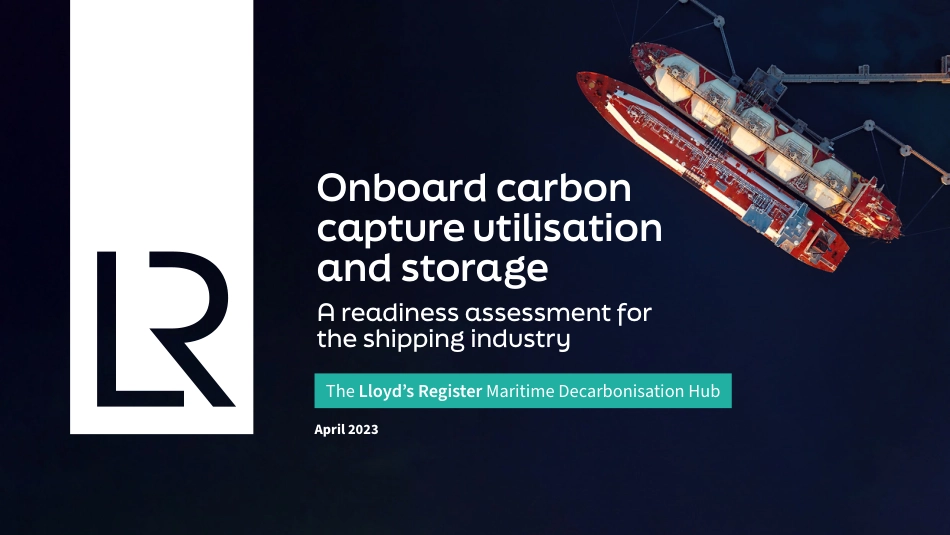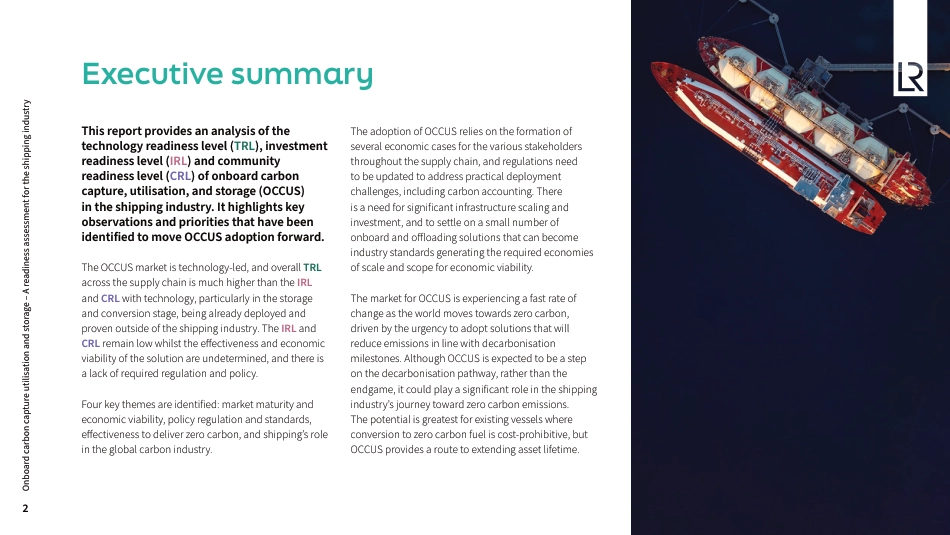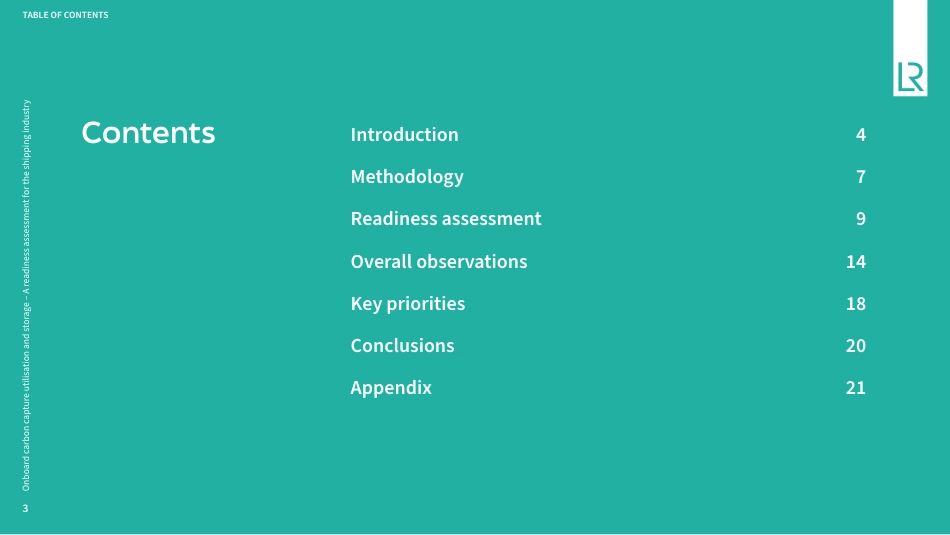OnboardcarboncaptureutilisationandstorageAreadinessassessmentfortheshippingindustryTheLloyd’sRegisterMaritimeDecarbonisationHubApril2023ExecutivesummaryThisreportprovidesananalysisofthetechnologyreadinesslevel(TRL),investmentreadinesslevel(IRL)andcommunityreadinesslevel(CRL)ofonboardcarboncapture,utilisation,andstorage(OCCUS)intheshippingindustry.IthighlightskeyobservationsandprioritiesthathavebeenidentifiedtomoveOCCUSadoptionforward.TheOCCUSmarketistechnology-led,andoverallTRLacrossthesupplychainismuchhigherthantheIRLandCRLwithtechnology,particularlyinthestorageandconversionstage,beingalreadydeployedandprovenoutsideoftheshippingindustry.TheIRLandCRLremainlowwhilsttheeffectivenessandeconomicviabilityofthesolutionareundetermined,andthereisalackofrequiredregulationandpolicy.Fourkeythemesareidentified:marketmaturityandeconomicviability,policyregulationandstandards,effectivenesstodeliverzerocarbon,andshipping’sroleintheglobalcarbonindustry.TheadoptionofOCCUSreliesontheformationofseveraleconomiccasesforthevariousstakeholdersthroughoutthesupplychain,andregulationsneedtobeupdatedtoaddresspracticaldeploymentchallenges,includingcarbonaccounting.Thereisaneedforsignificantinfrastructurescalingandinvestment,andtosettleonasmallnumberofonboardandoffloadingsolutionsthatcanbecomeindustrystandardsgeneratingtherequiredeconomiesofscaleandscopeforeconomicviability.ThemarketforOCCUSisexperiencingafastrateofchangeastheworldmovestowardszerocarbon,drivenbytheurgencytoadoptsolutionsthatwillreduceemissionsinlinewithdecarbonisationmilestones.AlthoughOCCUSisexpectedtobeasteponthedecarbonisationpathway,ratherthantheendgame,itcouldplayasignificantroleintheshippingindustry’sjourneytowardzerocarbonemissions.Thepotentialisgreatestforexistingvesselswhereconversiontozerocarbonfueliscost-prohibitive,butOCCUSprovidesaroutetoextendingassetlifetime.2Onboardcarboncaptureutilisationandstorage–AreadinessassessmentfortheshippingindustryContentsTABLEOFCONTENTSIntroduction4Methodology7Readinessassessment9Overallobservations14Keypriorities18Conclusions20Appendix213Onboardcarboncaptureutilisationandstorage–AreadinessassessmentfortheshippingindustryIntroductionTheshippingindustryisworkingtoreducegreenhousegas(GHG)emissionsasitplaysitspartintheglobalenergytransition.Thereisgrowingpressureonmaritimetoincreaseambitionfurther,goingbeyondtheinitialGHGstrategypublishedbytheInternationalMaritimeOrganisation(IMO)1.PolicymakersarepushingforalignmentwiththeParisAgreementtolimitglobalwarmingto1.5°Candsetapathwaytozeroemissionsby2050.Fulldecarbonisationrequiresthereplacementoffossilfuelswithnew,zerocarbonfuels.Arangeofzerocarbonfuelsareunderconsideration,suchasgreen2ammonia,methanolandhydrogen.However,introductionoftruezerocarbonfuelswilltaketime.Propulsionsolutionsbasedonthesefuelsareunderdevelopmentandaregraduallybeingdeployedonoperationalvessels.TheLloyd’sRegisterMaritimeDecarbonisationHubpublishestheZeroCarbonFuelMonitor3,whichgivesanoverallpictureofhowreadyzerocarbonfuelsolutionsarefordeploymentinshipping.WhilsttheupdateddecarbonisationtrajectoryisbeingnegotiatedattheIMO,short-termmeasuresthatdeliveremissionsandcarbonintensityreductionsinthenextfewyearshavebeensetbytheIMOrequiringshipownersandoperatorstomeetinterimemissionsregulations.Theconversationoverwhatmid-andlong-termmeasureswillbeestablishedcontinuesatIMO,alon...



 VIP
VIP VIP
VIP VIP
VIP VIP
VIP VIP
VIP VIP
VIP VIP
VIP VIP
VIP VIP
VIP VIP
VIP